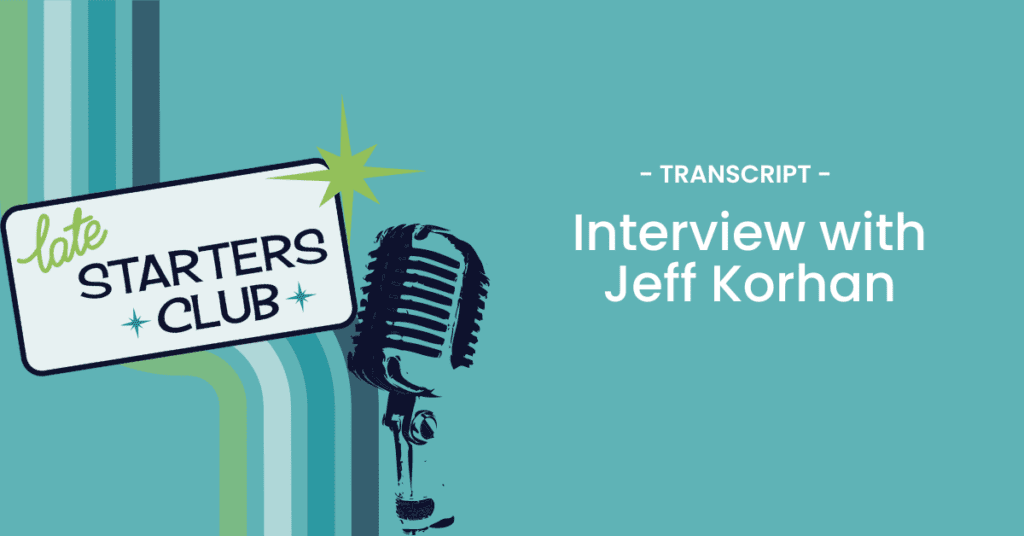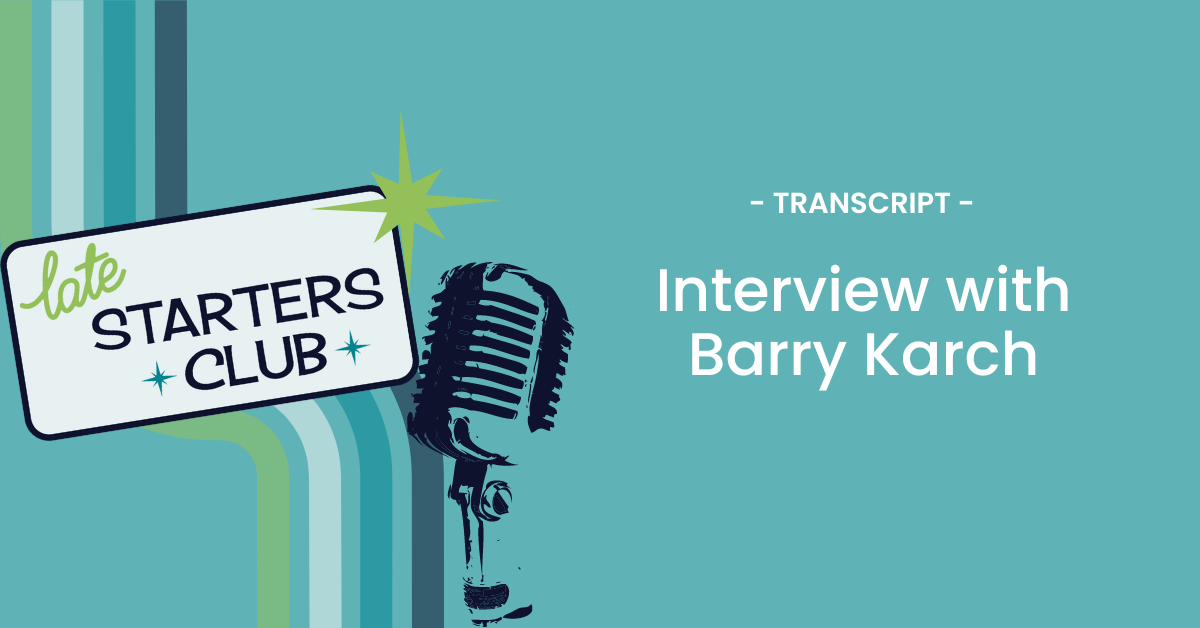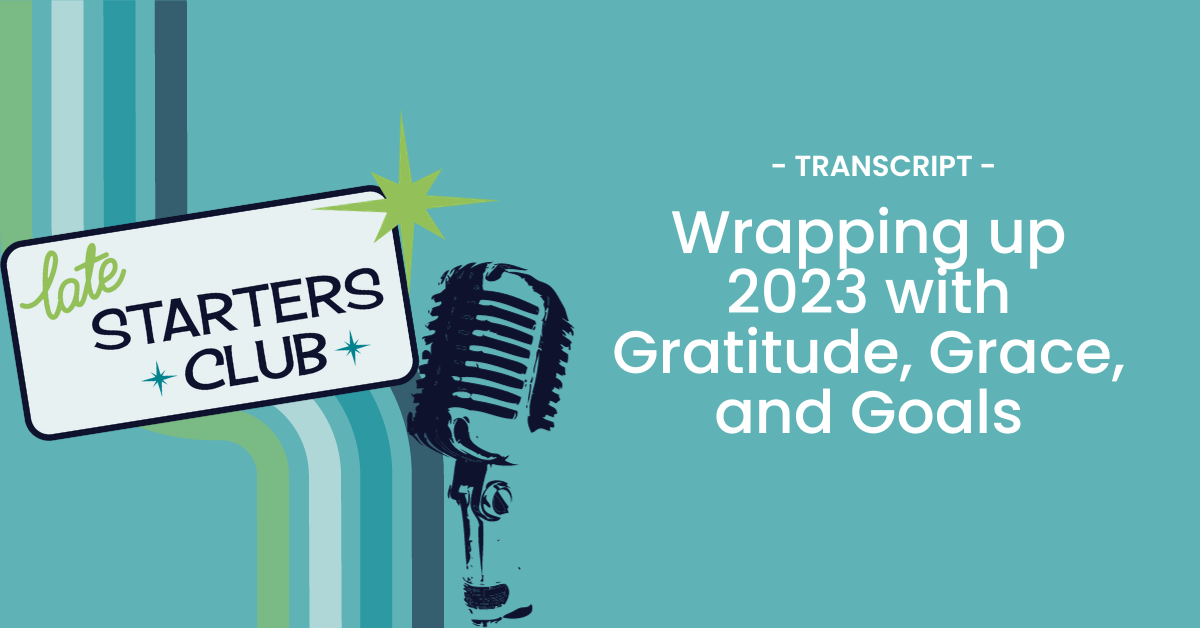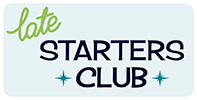Subscribe Apple | Google | Spotify | Stitcher | iHeart Living the Dream Overseas with Christine Gritmon Have you had a lifelong dream to live overseas and haven't made that happen yet? Maybe things have gotten in the way like family, jobs, life. My...
Ep40 Transcript: Interview with Jeff Korhan

Andrea Vahl: Hey, late starters, it’s your host, Andrea Vahl, and in today’s episode I interview my speaker marketing and author friend Jeff Korhan, and he has gone from not running, very much, to now running marathons regularly, and even qualifying for Boston. Listen in as he shares his tips to starting running marathons later in life.
Hello dreamers. Welcome to the Late Starters Club, giving you the inspiration mindset and tools you need to start something midlife and beyond. Remember, it’s never too late to follow your dreams.
Hello, late starters. It’s your host, Andrea Vahl, and I am here with the wonderful Jeff Korhan, he hosts two podcasts himself.
He’s a professional speaker, has spoken all over the place, and he is the author of Built-In Social, among other things. You do a lot, Jeff. You really do. So welcome, Jeff.
Jeff Korhan: Thank you. Thank you. Great to join you today.
Andrea Vahl: Yeah. I’m super excited. We’ve known each other for a long time. It’s fun to reconnect and I’ve followed your journey.
We’re not here to talk about any of your professional stuff. We’re here to talk more about…
Jeff Korhan: That’s good.
Andrea Vahl: Yeah, let’s leave that aside. Boring work stuff. I want to hear more about your journey in running marathons and you’ve been doing a lot lately and I’m super excited to see that. And we were talking a little bit before we started the recording, and I know you’ve been a runner for a long time, but you didn’t really start running marathons more seriously until later in life, right?
Jeff Korhan: That’s correct, yes.
Andrea Vahl: Yeah, so that’s why we’re chatting here. And I love that because I think a lot of people have this marathon on their bucket list. Maybe they didn’t get to it.
Maybe they were too busy when they were, it takes a lot of time to train. So you’re here to tell people it’s not too late.
Jeff Korhan: Interesting point about that, I did run my first marathon in 1986. I was 29 years old and so my motivation at the time was you did a little running in high school and you’re getting old so you better you better do this while you still can. And when I fast forward 30 years later, when I turned 59, I had the same mind process a little bit different cuz I was thinking about, boy, it would be really nice to run Boston. Maybe you should run another marathon. See if you can qualify. But I learned an interesting fact and that is 43% of all people running a marathon are where I was, meaning they’re moving into a new decade and that’s why they’re running that marathon.
Andrea Vahl: That’s really interesting. So you ran one at 29? . And then you didn’t run another marathon until you were 59?
Jeff Korhan: Yes.
Andrea Vahl: Both times you thought you were getting old
Jeff Korhan: Yes. Totally.
Andrea Vahl: So that’s awesome. And both times still not true. There we go.
Jeff Korhan: Yes. Yes.
Andrea Vahl: So awesome. So basically you picked it up again, your motivation was that it was time to do this was now, is that why you started this endeavor?
Jeff Korhan: It was like some things happened.
Okay. So my kids who are adults now, they’re in their thirties, early thirties they said, Hey, we’re running this 8K, this five-mile run. It’s called the Shamrock Shuffle. What do you think? And I thought, yeah, I’m not in very good shape, I used to be a runner. So I did some training and when I say training, went out, did a mile or that kind of thing.
Maybe I ran twice in a week and thought that was a lot. But I honestly don’t remember anything beyond that other than being in the race. And so here’s what happened. I’m running along in the race. It’s a five-mile race. I get to the two-mile mark. I’m expecting to fall apart and I don’t, and I keep going.
And suddenly it just hit me at the three-and-a-half mile mark, which is going up a steep hill. And I’m like, oh boy, here it goes. And I just charged up the hill with all the young people that were right next to me. And I got scared and I said, something is seriously wrong. You’re supposed to be tired now.
And that didn’t happen. And so I finished the race and as it turned out, it ran a pretty good time. And so that’s really what sort of kicked things off. So after that, I then got more motivated to start running some more. And then as I said, that’s what led to, if you could do five miles, maybe you could do a 13, and if you can do that, maybe you could run another marathon.
And what about, Boston, if you any kind of a runner in the back of your mind, in some shape or form, probably have thought, boy, that would be really cool to run Boston. Because that’s just the big, the big daddy, the one that’s been around for a hundred-plus years and that’s really been the driver for so many years since.
Andrea Vahl: Yeah. . So that is awesome. And so Boston, you have to get a sub-four time, right? Sub four, is that right?
Jeff Korhan: It depends upon your age group. Yeah. So it’s age-graded. For the late starters out there, this is one of the benefits of getting older is you get a little bit more time and so they call this aging up.
So at the time I needed to break. It gets sticky, or at least it did back then. They have a time you have to hit, but just because you hit that time doesn’t mean you get in. Okay. If there’s too many people that apply with an approved time they thin the field. At the time that I broke four hours and I thought I needed, I think the qualifying time for me at the time was 3 55, but sure enough, I knew it’d be at least five minutes lower than that.
And I had just come off some injuries actually. You and I bumped into each other at the convention in Denver. And I had a boundless run 10 miles through the mountains and came home and couldn’t walk, I swam for a month or so before that race. Anyway, long story short, I did break four hours, but I was wise enough to set the goal to not to try to bq, which is qualify for a Boston just to break four hours, which I did.
Andrea Vahl: Right? Yeah. Oh, that’s great. That is amazing. Because to go from, and you’re probably, are you getting better times now than you were when you were 29?
Jeff Korhan: Oh yes. Yeah, totally. That’s the funny thing is, that’s the point of that. Why am I not getting tired? There is an endurance factor that when you get older, you do get faster. In fact, when I was running the Naples half marathon we were talking pre-show I, that’s where I bumped into a guy that I’d connected with on Strava, who was the world record holder in the 70-plus age group. And we were chatting and he is how old are you? And I said, I’m at the time I was 62 or something.
And he says, oh that’s the perfect time. He says, now, you’re going to really start and get faster as you get older. Great. I’m what, cause he’s he says that’s when I was running like 3:30 or 3:20 and he ended up running a 2:53 or so when he was 71. Yeah.
Andrea Vahl: Whoa. That is crazy. Crazy. That is crazy. That’s wild.
Now, you mentioned injuries. Are there different, obviously as we’re getting older you have to deal with possibly some injuries? Do you feel like there’s, is there a difference between training now versus running when you were younger, things you watch for or,
Jeff Korhan: Yes. So when I came back in 2017, what I discovered was first of all, there wasn’t an internet back when I was in high school and running. I was doing everything wrong. People must probably think if their listening, how hard can it be?
You go outside and you run I have a log of every single workout. My cadence, steps per minute. Heart rate. , which is a big part of how I train heart rate factor. So many things, so that this has become just one giant science experiment. So first I learned how to run again.
Then I learned about shoes then I learned about diet and different types of training. When I ran my first marathon, coming back. In 2017, I’m going to hit the midpoint at a very fast time. I probably would’ve broken, I would’ve ran about 3:45. But then the last part was the whole nother story.
But back then, I didn’t know what I was doing. I went out every single day and ran as fast as I could. Which is like the stupidest thing in the world you could do. But I didn’t know any better because that’s how we ran, back in the seventies when I was in high school.
Andrea Vahl: Yeah. Yeah. Wisdom has come into play a little bit more, right?
As we’re getting older, we know better, right? We’re researching more, we’re figuring things out more. And and I think it’s interesting that he says, you get faster. You said that too. You’ve got more endurance and people can run faster when, that’s just so counterintuitive.
I wouldn’t have thought that. So
Jeff Korhan: it is. There’s a lot of science on, how you use fuel, which is and I’m going to get maybe some of this wrong, but let’s see. Fats and carbs and how they’re burned. But long story short, if is, if you stay aerobic for as long as possible, the carbs you have, and you’ve got two hours worth of carbs stored in your liver. I think we call this glycogen. Again, I’m, I hope this is correct, but and people take gels as they go through a marathon to add more fuel, but this is why most people hit the walls. They run out of fuel. So by training aerobically, you’re teaching your body to burn fat as long as possible so that when you get to the second half of the race or the last six miles of a marathon, whatever that may be, you still have plenty of fuel to get to the finish line.
So , since I started doing that, I’ve never hit the wall. In fact, the only time I hit the wall was the first one coming back after that. I, it’s yeah, I got tired. Yeah. My legs fell apart. An injury not, a old injury came back or whatever. Things do happen out there.
People get tripped. I had some experiences this year. I did three marathons, but in, in New York City. Just some crazy stuff with people, well-meaning people were handing out ice. And I looked at that ice ahead and I says, this is not a good idea. The guy ahead of me slipped on it. I slipped into him.
The guy behind me slipped into me. And then it felt like I had a stick in my shoe. And I stopped multiple times. Lost a ton of time trying to get that stick outta my shoe, only to realize that it somehow had, it had turned my shoelace back inside.
Andrea Vahl: That’s crazy.
Jeff Korhan: But that’s how it’s,
Andrea Vahl: that happens, right?
That happens That, yeah. Crazy little thing. I’ve run two marathons myself way before kids and things like that. And training is such a process. So it’s interesting that you’re training differently with just all the research you’re doing.
Yeah. That’s cool.
Jeff Korhan: Yeah, just being able to learn from people on Strava following the people that are more talented and then finding your way. There is no one plan that’s been, that’s a big conversation is, what works for you may not work for me.
This friend of mine who’s world record holder I mentioned, he likes to say, I don’t train, I race. And he literally races like every week. Sometimes he’ll do two, three races in a week.
Andrea Vahl: Oh, wow.
Jeff Korhan: And so if that works for him, that’s great. I, my body couldn’t hold up to that.
Andrea Vahl: Yeah. You did say that no two runners are alike too. So that’s an interesting part of it. Just discovering what it is for you, what it takes for you what you need. The patterns you might have and stuff like that. So that’s an interesting, yeah.
Now, what have, what has been like along this journey, what, what has been the biggest takeaway for you as you have started this? I don’t know if you had planned on running several marathons a year like you did this year. I don’t know. Was that part of your plan?
Jeff Korhan: No it wasn’t. My overriding goal was to get into Boston and what happened was I was in peak form in Covid.
Something about Covid just freaked me out. And when they let us outside, so to speak, in Chicago I started running and it was like March and I says, I’m going to set a new goal, run a half marathon every month. I ran four of them in April. That’s how much I was running.
Andrea Vahl: Wow.
Jeff Korhan: But there were no races, right?
No marathons. Okay. The following January is when the Naples half came up and that’s when I qualified. Interesting stat. Okay. New York is actually harder to time qualify than Boston, believe it or not. But the key thing and how most people time qualify as I did is by running a half marathon.
They’re the only marathon that takes a half as a qualifier. So that got me into New York. . I knew I was going to run Chicago cuz New York is a tough race. That was going to be for fun. It’s like if you get in, you gotta run it. Yeah. But Chicago was where I was going to try to qualify for Boston. But because I was in such great shape, I thought let’s run this local race up in the Chicago suburbs.
And it did not go well because of a variety of reasons. We don’t probably have time to cover pace groups and things like that. So Knowing I couldn’t make it. I just stopped after 20 miles because my legs were killing me. And I go home and my wife says, you didn’t finish? And then I go down to the parking garage in our condominium complex and another guy says, you didn’t finish?
And I’m like, what is this finishing stuff? Is this like a big deal that I didn’t hear about? I thought, I couldn’t achieve my goals. So that was a huge. I just, it took me weeks to get over that and I thought okay. I was trying to understand people’s perspective and I guess it comes from I don’t run marathons, so if I, could I do anything, I would finish I set a goal when I ran Chicago this year. I set four goals, and I can’t remember exactly what they were, but there were four of them. And so here’s the story. , I’m with this PACE Group , and I said I would never run with a PACE group after the April run. , I did anyway. And the same thing happened. If you know anything about pacings, some people are better than others and I’ve been with a great paces before. But this was start, stop, start stop. And that’s just like good start. Stop with a car. Burns more fuel.. So does it burn more energy when you’re running?
And my legs were killing me. And after 10 miles and I’m like, this is crazy. I run 10 miles twice a week. Three times a week sometimes. So we get to the midpoint and I basically stopped. Not basically I did stop, I says, take a long restroom break take a gel take a couple of Advils for the pain in your legs.
. And let’s go down to goal number four, which was to qualify for Boston. So that was a funny thing is because I aged up to 65, I really did have more time than I probably needed even having a bad day so far. . And That’s what happened. So I kicked my butt. We got going.
I tried to run faster, but my legs really were shot by then because of the erratic pacing. But , hey, I crossed the finish line. I got a bq. But the end of the story is actually even more interesting, so I went to the race feeling great. . But the night before I had chills and I thought that’s odd cuz I get hot at night.
I don’t get chills. And then I had chills again after the race that evening. And then I said, would this be, and I looked at, I did some Googling and then my wife says, we’ve got covid test at home, just take one. And I took it and I’m like, I just got my BQ with Covid. Meaning I had it before I even went to the starting line.
That’s why my legs were killing me. But I guess the lesson here is what everybody said to me about the marathon that I didn’t finish was good advice cuz it got me to really build a plan and not just a plan A and a plan B or a C, but it was plan D that finally, got really nice result out of that.
It makes me feel good about the experience and I learned a ton about that whole experience.
Andrea Vahl: Yeah. Because, yeah, sometimes, especially in racing things. Yeah. When things go completely sideways. It’s hard when you feel like disappointed at the end. Any competition you want to feel good about cuz of all the training that you’ve put into it and everything.
It’s amazing You got such a great result. Having COVID and that’s incredible. Wow. Have you run Boston? No. So Boston is next year then. Yes.
Jeff Korhan: No, actually , the way it’s done, because I did it so early in the season. This is for 2024.
Andrea Vahl: Oh, wow. Wow. Yeah. Okay.
Jeff Korhan: Which is all right.
I’ve got this year off in the fall because my daughter’s getting married, so I’ve been advised that there will be no fall marathons, because she’s getting married in September.
Andrea Vahl: Yeah. Oh, that’s great. That’ll be fun. Yeah. You can run her down the aisle, right? . . So what have been some of the, unexpected benefits that you’ve gotten out of running?
Jeff Korhan: We’ve all heard the expression, life is a marathon, not a sprint.
It really does reframe how you process time. And a sidebar, I was a meditation instructor for gosh, 15 years. And, that’s really the lesson that comes outta meditation is, just quit processing all this anxiety and everything else and just be yourself at a base level, for lack of a better word. And life will go a lot smoother for you. And so I had a very strange experience once this goes back to, yeah, a few years back. Normally I run with music. I didn’t do this when I was younger, but I found that really just keeps me moving, gets me motivated. The right song will, we’ll pick up the pace and whatever.
I forgot to turn my music on this day. And I kept hearing this breathing like, and I’m like I’ll pick up the pace then, and get ahead of this person. And so I kept doing this and I kept doing this, and then , it just hit me that breathing is you, Jeff!
And so I had fallen into this. It’s all the stuff that clutters your mind, including music, had fallen away. And what they talk about in meditation, which is you’re observing yourself as a, a third person. And it was just such a cool experience and it really taught me why we get out there.
Despite nagging injuries and whatever, you can really have a good time and really enjoy this. And yeah that’s been the best part about running for me is I’ve always enjoyed it and I am not one of the fortunate ones who doesn’t have to stretch or do any, cross training or whatever.
I have to do that stuff. But nonetheless, it’s why runners, there’s code, don’t complain about your injuries. We’ve all got ’em. Just enjoy the ride.
Andrea Vahl: Yeah. Interesting. Yeah, that’s good. That’s good. I like that. Yeah. So I didn’t ask you this or prep you for this question ahead of time, but I’m sure you will be able to just rattle off lots of helpful resources.
But what kinds of resources. Have you found out there that have helped you with your running? It doesn’t have to be specific to later in life, but is there anything in particular that has helped later in life? Or you mentioned a group that you’re a part of with that other person, but what other things can you give for advice for people who are looking to get started with a marathon later in life.
Jeff Korhan: Oh let’s see, A few resources. One, there’s a physical therapist by the name of, I can’t think of his first name, but his last name is Dicharry, D-I-C-H-A-R-R-Y.. He’s got a couple of books out that running rewired is one of them.
And there’s another one that’s more technical. I’ve got a science background, so the technical one is the first one I read, and I really got a lot out of that. But the second one is more practical about how to do things. And I think this is important, especially as you get older that you have to rebuild the chassis heat, like your vehicle, meaning, you have to do weightlifting to support the stress that your body’s going to take on when it’s running. So that is something that has really kept me going and made me faster and made me more injury free.
But, really the best resource I can give is a guy that I stumbled across last year when I did something dumb and injured myself.
He goes by Knees over Toes Guy, and he’s got tons of videos on Instagram and YouTube. Everything he does with his programs is free. I’m actually paying for the program to get personalized attention to, are you doing the right form, which is important. But anyway so many things that we were taught, and so knees are really important for running.
So our ankles and all this stuff is connected. They call it the kinetic chain, but that guy, I can’t get enough of it because just like everything I learned about running in high school was wrong. Everything most of us have learned about, don’t go past a 90 degree squat as it turns out.
And the science of supporting this, a full squat all the way They call it ass to grass. He named the group Athletic Truth Group, and the advocates renamed it Ass to Grass because that full squat where you’re getting all the way down to the ground where you compress everything.
But the cartilage, compressing cartilage gets blood flow to cartilage and it heals it. Same thing with ligaments and muscles. and everything. When I hear about people getting knee replacements or wanting to get them I try lightly to talk them out of it, but most of them don’t want to hear it.
But the truth is you can actually heal most of these injuries. It’s, it may take years, but that’s one of my projects is determined to, because during covid. . I was feeling great, but I went in , to the doctor just for the heck of it because it was covid and there were no races.
And he said, after the MRI says, oh my gosh, you gotta a tore meniscus. You got this. I’ve got dozens of things. And I’m like, it is, you need to stop all the pounding, meaning stop running. And I thought I’m not going to do that. But he did recommend a physical therapist. And, we’ve worked together and things have gotten better.
And guess what? , you won’t read about this much, but there is some science if you can find it, that says, yes, meniscus can rebuild themselves. . And so I’m just making that part of, I don’t have a choice. If it’s torn, then I guess I gotta hope I can do the right exercises to fix it.
Andrea Vahl: Right, yeah. Awesome. We’ll link to those resources in the show notes for sure. But that sounds great.
I’m anxious to dive into it because, I’ve been a runner for a while and just do half marathons. . It is funny cause I’ve thought gosh, I’ve never really had a lesson on running, you take ski lessons, you do other types of lessons or, have a trainer for certain things and I’ve never done that for running.
And I think I’ve never read about a lot of that stuff, so I’m anxious to dive into some of that too.
Jeff Korhan: Yeah. And as, especially as you get older it’s the things that will keep you running. Like when I started running, and trust. I was taught in high school, heel to toe big strides cuz you’ll cover more ground faster.
That’s all wrong. . And so anyway, my cadence back then was like 164 and I’ve worked at up to 181 on most days. But 180 is the number. They say that the average pro, some have a two like Molly Sadel. , her name is not pronounced the way it sounds. But anyway the, she got the bronze and the gold bronze and the recent marathon she’s got like a 220 plus cadence, but she’s also smaller and has a different way of running.
, some people have slightly slower, but it makes you more efficient. And it makes you less injury prone. . And who knew? This is valuable information that . Might have prevented some of those old injuries.
Andrea Vahl: Yeah. No, that’s great. That’s great.
I always like to wrap up with your favorite quote and inspiration or whatever keeps you going.
Jeff Korhan: Okay, so I heard this quote a long time ago and it’s not written down, so hopefully I’ll remember it. But it’s what got me really to leave my corporate job and do something on my own which was really what I needed to do. I didn’t fit well in the corporate world, but it does keep me going too on things like all this running, but it’s by Henry David Thoreau and he says, if you advance confidently, in the direction of your own dreams, an endeavor to live the life that you have imagined you’ll meet with success, unexpected in common hours.
Andrea Vahl: That’s awesome. Yeah, I love that. I love how you emphasized you, the you in there. I think that’s really important.
Jeff Korhan: Because when I learned it, this was from a speech from Wayne Dyer. . That’s exactly how he said it, and that’s what resonated with me was, yes.
Andrea Vahl: It’s what you dream.
Yeah. . Yeah, . That’s awesome. Jeff, thank you. This has been, Tons of fun. I’m inspired. Now, I have to say, I have thought that it’d be fun to run another marathon. I’m a slow runner. It’s not about speed for me. I’m like the tortoise in the hare. I’m the tortoise right there. I got the endurance, not the speed, but maybe with some of these resources, maybe I’ll get a little faster.
Jeff Korhan: Yeah. And you will, but you don’t have to. That’s the nice thing. It’s, the last I so want to go back and run the New York City Marathon again. It’s a tough race, but man, is it fun? . The crowds of the energy. . And the diversity of just people, many people are walking cause there’s a lot of hills with the bridges, but it just is a lot of fun and.
That’s the thing, is just to find the balance in there somewhere.
Andrea Vahl: And just run. It’s always a race with ourselves. It’s never against anyone else. It’s always just our own race, . So thank you so much Jeff, and I appreciate your time and hopefully your inspiration for other runners starting later.
It’s life. It’s not too late. 59. 69. 79 whenever. So thanks again.
Jeff Korhan: Okay. Thank you. It was my pleasure.
Andrea Vahl: Hope that was helpful and make sure you grab the free guide Top Tools for Late Starters on the website at latestartersclub.com and let’s turn dreaming into doing.
Join the conversation.
Let us know what you think about this episode.
Never miss an episode.
Subscribe to the podcast
You may also enjoy…

Ep170 Transcript: Finding New Motivation with Barry Karch
Finding New Motivation with Barry Karch Andrea Vahl: It's never too late to restart something you loved. My guest today, Barry Karch, started training for a marathon after a 20 year hiatus. And we'll also dive into how he climbed the equivalent of Mount Everest...

Ep169 Transcript: Questions to Kick Start 2024
Andrea Vahl: Oh, happy new year. Yeehaw. 2024. All right. I don't know about you, but I love planning out my year and setting goals and really reflecting on how my past year went and being super intentional about what I want the next year to look like. In today's...

Ep168 Transcript: Wrapping up 2023 with Gratitude, Grace, and Goals
Hello, late starters. It's your host, Andrea Vahl And today is Christmas day. And if you do celebrate that Merry Christmas, if you celebrate some other holiday, I wish you all the best and all the joy for that. I just wanted to make a different episode. So today we're...


0 Comments